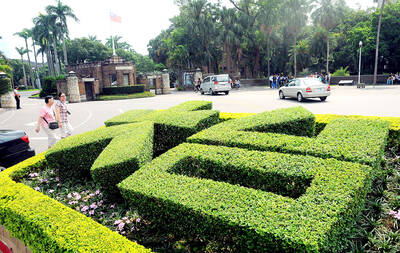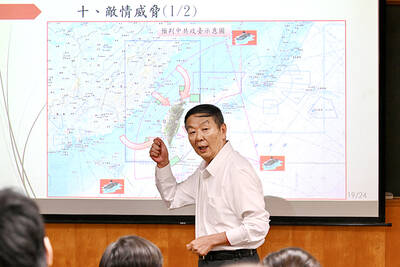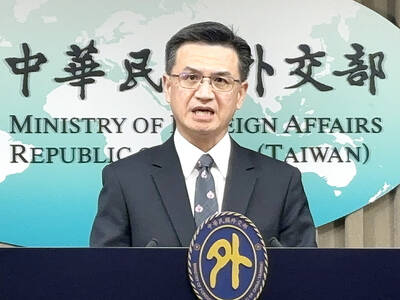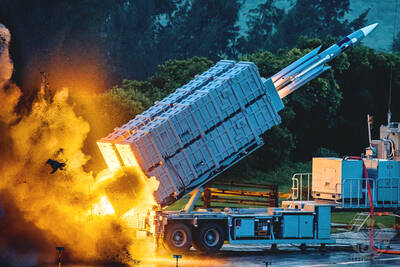Antai Life Insurance Co (安泰人壽), a new subsidiary of Fubon Financial Holding Co (富邦金控), yesterday won the auction for the Shin Kong Mitsukoshi A11 department store building with a bid of NT$11.6 billion (US$347 million), NT$1.6 billion higher than the floor price.
The auction, held in the headquarters of Shin Kong Life Insurance Co (新光人壽), owner of the building in Xinyi District (信義), drew two other bidders, Cathay Life Insurance Co (國泰人壽), the nation’s largest insurer, and Tinghsin International Group (頂新集團), the instant noodle giant.
Fubon Financial president Victor Kung (龔天行) said he was glad Antai Life won the bid as it would enhance the insurance company’s asset portfolio.
“The building is expected to generate near 4 percent of annual rental yield on the premium,” Kung said by telephone.
Kung said the purchase of the Shin Kong building fell in line with Antai Life’s goal of raising its stake in real estate properties. Property investment accounts for barely 3 percent of its total investments and the company intends to boost the figure to between 5 percent and 10 percent over the next few years, he said. Shin Kong is expected to book an estimated gain of NT$7.3 billion from the sale, it said in a statement to the stock exchange yesterday.
The building sits on 2,534 ping (8,377m2) of land with total floor space of 19,205 ping (63,489.11m2) and will continue to house the department store as the lease will not expire for four years.
Jeffrey Huang (黃增福), head of research at Evertrust Rehouse (永慶房屋), called the deal a bargain, adding that commercial properties remained attractive.
“The building is a worthy investment choice for business groups with ample idle funds,” Huang said by telephone. “But only buyers with deep pockets can afford to take part in the bid.”
It cost Antai NT$3.7 million per ping for the land alone, the third highest price in the district.
Shin Kong Life, while losing money in recent years, reaped a large profit of NT$7.28 billion from the sale. The third-largest insurer acquired the land in 1988 for NT$2.8 billion and spent another NT$1.52 billion to construct the building, a company official said, asking not to be named.
“The gain did not include rental income over the years,” he said by telephone. “The company sold the property to strengthen its capital structure and adjust its real estate portfolio.”

Taiwan has experienced its most significant improvement in the QS World University Rankings by Subject, data provided on Sunday by international higher education analyst Quacquarelli Symonds (QS) showed. Compared with last year’s edition of the rankings, which measure academic excellence and influence, Taiwanese universities made great improvements in the H Index metric, which evaluates research productivity and its impact, with a notable 30 percent increase overall, QS said. Taiwanese universities also made notable progress in the Citations per Paper metric, which measures the impact of research, achieving a 13 percent increase. Taiwanese universities gained 10 percent in Academic Reputation, but declined 18 percent

RETHINK? The defense ministry and Navy Command Headquarters could take over the indigenous submarine project and change its production timeline, a source said Admiral Huang Shu-kuang’s (黃曙光) resignation as head of the Indigenous Submarine Program and as a member of the National Security Council could affect the production of submarines, a source said yesterday. Huang in a statement last night said he had decided to resign due to national security concerns while expressing the hope that it would put a stop to political wrangling that only undermines the advancement of the nation’s defense capabilities. Taiwan People’s Party Legislator Vivian Huang (黃珊珊) yesterday said that the admiral, her older brother, felt it was time for him to step down and that he had completed what he

BULLY TACTICS: Beijing has continued its incursions into Taiwan’s airspace even as Xi Jinping talked about Taiwan being part of the Chinese family and nation China should stop its coercion of Taiwan and respect mainstream public opinion in Taiwan about sovereignty if its expression of goodwill is genuine, the Ministry of Foreign Affairs (MOFA) said yesterday. Ministry spokesman Jeff Liu (劉永健) made the comment in response to media queries about a meeting between former president Ma Ying-jeou (馬英九) and Chinese President Xi Jinping (習近平) the previous day. Ma voiced support for the so-called “1992 consensus,” while Xi said that although the two sides of the Taiwan Strait have “different systems,” this does not change the fact that they are “part of the same country,” and that “external

UNDER DISCUSSION: The combatant command would integrate fast attack boat and anti-ship missile groups to defend waters closest to the coastline, a source said The military could establish a new combatant command as early as 2026, which would be tasked with defending Taiwan’s territorial waters 24 nautical miles (44.4km) from the nation’s coastline, a source familiar with the matter said yesterday. The new command, which would fall under the Naval Command Headquarters, would be led by a vice admiral and integrate existing fast attack boat and anti-ship missile groups, along with the Naval Maritime Surveillance and Reconnaissance Command, said the source, who asked to remain anonymous. It could be launched by 2026, but details are being discussed and no final timetable has been announced, the source